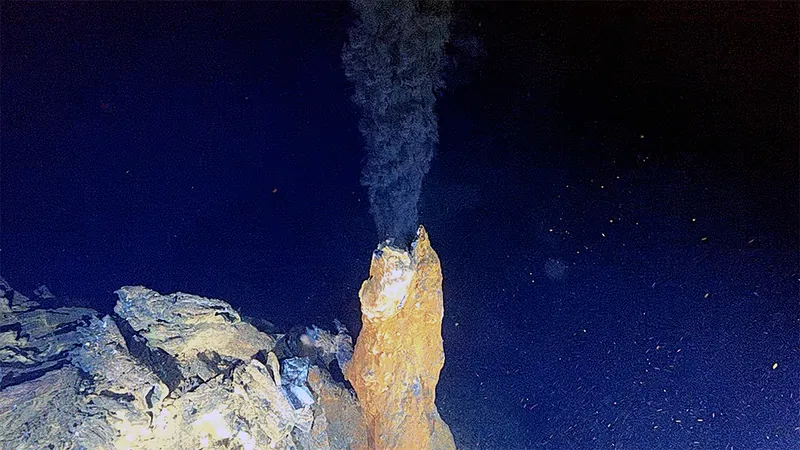
Unveiling the Secrets of the Arctic: Hydrothermal Vents Could Hold Clues to Life on Enceladus!
2024-12-17
Author: Wei Ling
Unveiling the Secrets of the Arctic: Hydrothermal Vents Could Hold Clues to Life on Enceladus!
For decades, scientists have been captivated by the icy worlds of our solar system, particularly Saturn’s enigmatic moon Enceladus, which, like Earth, has vast, ice-covered oceans. New research has unveiled an incredible discovery: beneath the frigid waters of the Arctic Ocean lie hydrothermal vents that could closely resemble those on Enceladus and could potentially provide the ingredients necessary for the genesis of primitive life.
In a groundbreaking expedition funded by NASA, an international team of researchers deployed an uncrewed submersible to the Arctic near the North Pole, exploring a vent field known as Lucky B, marking the third hydrothermal vent site they have rigorously examined. All three sites explored so far, including Aurora and Polaris, have yielded high concentrations of molecular hydrogen and methane. However, what truly surprised the researchers was the distinct geochemical signatures of each site, suggesting multiple geological processes may lead to hydrogen-rich venting in these Arctic locations.
Chris German, a marine geochemist with the Woods Hole Oceanographic Institution, expressed his excitement at the findings presented at the American Geophysical Union's Annual Meeting. "We had suspected such hydrothermal features existed in the Arctic, but confirming three unique sites is remarkable! This diversity suggests that similar processes could be happening in icy environments beyond our planet,” he noted.
Journey to the Depths: Exploring the Hidden Hydrothermal Vents
The extreme conditions of the Arctic Ocean have long posed significant obstacles to exploration. German and colleagues first published evidence of hydrothermal activity in the Arctic two decades ago. Advances in robotic technology have enabled the team to explore these sites along the Gakkel Ridge, a volcanic formation stretching 1,800 kilometers beneath the Arctic ice.
These hydrothermal vents operate via a fascinating mechanism: cold seawater seeps through cracks in the Earth’s crust, interacts with molten rocks, and then, enriched with various chemicals, is expelled back into the ocean at scorching temperatures, sometimes reaching 370°C (698°F). Each vent's unique geological makeup results in varying chemical compositions, providing a unique ecological niche that supports vibrant microbial communities, thriving in the complete darkness of the ocean's depths.
Elmar Albers, a marine geoscientist involved in the research, remarked on the astonishing diversity of chemical systems present along this ridge. His upcoming studies on the Polaris site will deepen our understanding of these ecosystems and their implications for life in extraterrestrial environments.
Cosmic Connections: The Implications for Enceladus
The findings from the Arctic oceans are not only important for understanding Earth’s geology but also offer tantalizing insights into the potential for life beyond our planet. NASA's Cassini mission, which surveyed Saturn and its moons, discovered geysers on Enceladus that released water vapor laced with hydrocarbons—indicators of possible biological activity.
A panel of planetary scientists has even urged NASA to prioritize a flagship mission to Enceladus, and the Arctic vent studies are seen as crucial groundwork for understanding the complexities of alien oceanic systems. Christopher Glein, a geochemist and planetary scientist, emphasized the importance of studying these accessible vent sites on Earth to inform future explorations of icy moons.
This research opens a new frontier in our quest to understand the potential for life beyond our planet, allowing scientists to explore the geological processes and the corresponding biosignatures that could exist in the depths of Enceladus's oceans.
As researchers continue to unravel the mysteries of these hydrothermal vents, we are left wondering: Could we one day discover that life thrives in the frozen seas of worlds far beyond our own?
Stay tuned as we uncover more of these scientific revelations that could shape our understanding of life in the universe!


 Brasil (PT)
Brasil (PT)
 Canada (EN)
Canada (EN)
 Chile (ES)
Chile (ES)
 España (ES)
España (ES)
 France (FR)
France (FR)
 Hong Kong (EN)
Hong Kong (EN)
 Italia (IT)
Italia (IT)
 日本 (JA)
日本 (JA)
 Magyarország (HU)
Magyarország (HU)
 Norge (NO)
Norge (NO)
 Polska (PL)
Polska (PL)
 Schweiz (DE)
Schweiz (DE)
 Singapore (EN)
Singapore (EN)
 Sverige (SV)
Sverige (SV)
 Suomi (FI)
Suomi (FI)
 Türkiye (TR)
Türkiye (TR)